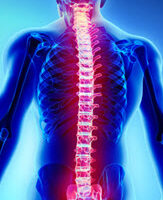Spinal Cord Injury Causes and Risks

Spinal cord injuries are one of the most serious kinds of injuries that a person can sustain and occur much more often than most people realize. In fact, the National Spinal Cord Injury Statistical Center (NSCISC) estimates that around 17,000 people sustain spinal cord injuries every year, many of whom suffer from permanent disability for the rest of their lives. If you or a loved one suffered a spinal cord injury through no fault of your own, please contact one of our dedicated Florida spinal cord injury lawyers to learn more about your legal options.
What Qualifies as a Spinal Cord Injury?
Spinal cord injuries are defined as any injury where the spinal cord or the nerves located at the end of the spinal canal are damaged. The spinal cord is located inside the vertebrae and is made up of a network of nerve fibers, which allows it to carry messages to and from the brain to the rest of the body. For this reason, the spinal cord is largely responsible for controlling motor, sensory, and autonomic functions. When the spinal cord is damaged, the ability to send and receive messages below the site of the injury is impaired, sometimes permanently. Injuries range from bruises, where the spinal cord is damaged, but left intact, to complete severance. The extent, as well as the location of the damage sustained by the spinal cord dictates the exact type and severity of the loss of function that a person experiences.
Causes of Spinal Cord Injuries
Spinal cord injuries have a number of different causes, including disease, tumors, and loss of oxygen. However, trauma is the most common cause of this type of injury and goes hand in hand with the following types of accidents:
- Car crashes;
- Falls;
- Acts of violence, such as gunshots;
- Sporting event accidents; and
- Recreational activity accidents.
Although falls are the most common cause of spinal cord injury in the elderly, and athletes like skiers, gymnasts, and divers are more likely to suffer damage to the spinal cord than others, these types of injuries are not limited to these groups.
Signs and Symptoms
The symptoms of a spinal cord injury depend on whether the injury was complete or incomplete. Complete injuries are those that result in the loss of all feeling and movement below the site of the injury, while incomplete injuries are characterized by the retention of some feeling and movement below the injury site. Symptoms also depend on where the injury occurred, such as the middle or lower part of the back, or the neck. However, most spinal cord injury victims can expect to suffer from some or all of the following symptoms:
- Paralysis;
- Lack of coordination;
- The inability to feel sensations, such as temperature or touch;
- Difficulty breathing or clearing the lungs;
- Spasms or exaggerated reflexes;
- Numbness or weakness in the limbs;
- Problems with balance and walking;
- Loss of bowel or bladder control; and
- Severe pressure or pain in the neck or back.
These symptoms can lessen or worsen over time, depending on the severity of the injury, which means that some victims could be left to struggle with pain and paralysis for the rest of their lives.
Call Our Office Today
If you sustained a spinal cord injury in an accident that was not your fault, you can and should seek compensation for your medical bills. Please contact one of the dedicated Fort Lauderdale spinal cord injury attorneys at Boone & Davis by calling 954-566-9919 to learn more about filing your own claim.
Resource:
nscisc.uab.edu/Public/Facts%202016.pdf
